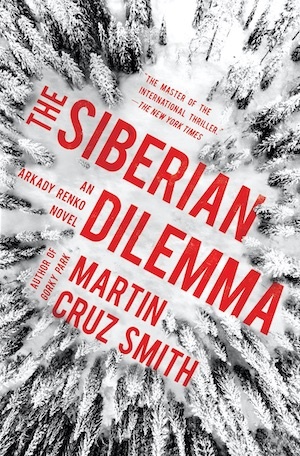Written by Martin Cruz Smith — On average, a new Arkady Renko novel only arrives every 4.75 years, so if you’ve read any of Martin Cruz Smith’s previous books featuring the Moscow detective you’ll know that The Siberian Dilemma is a reason to celebrate. Renko is a principled investigator in a system where the law is extremely arbitrary, so he has to find fair ways of achieving justice… without getting himself killed. If you’re a fan of Philip Kerr’s Bernie Gunther novels, you’ll be right at home with Renko.
The Siberian Dilemma takes place in today’s Russia, and Putin’s regime seems every bit as cruel and repressive as that of Leonid Brezhnev, who ran the Soviet Union back when Renko first appeared in Gorky Park. The book opens dramatically as Renko shoots a rampaging bear that has escaped from Moscow Zoo. He doesn’t kill it, though. The gun was loaded with a tranquilliser dart and besides, our Investigator of Special Cases is not a bloodthirsty man.
Then we learn about Renko’s latest case. Zurin, the corrupt prosecutor he works for, is sending him to Siberia to take the confession of a so-called Chechen terrorist. He flies out, leaving behind his 17-year-old adopted son Zhenya and the boy’s girlfriend Sosi in Moscow. Despite what you’d think, Renko is pleased to be sent to Irkutsk because his girlfriend, the journalist Tatiana Petrovna, is out there too. She was meant to return to Moscow but hasn’t and Renko is worried. He’ll be able to kill two birds with one stone.
Martin Cruz Smith’s prose flows as lucidly as ever. The author has a knack for working witty observations about Russian life into the text, celebrating the unique facets of the society and culture while highlighting the very glaring flaws in the country’s politics and institutions. The case against Aba Makhmud, for example, is a sham. Accused of attempted murder, what he actually did was fire a gun into the air and his accuser is none other than Zurin himself… a man with something to hide.
While sorting out what actually happened before Aba was sent to Siberia, Renko begins searching for Tatiana. She’s been working on a story about an oil and gas magnate called Mikhail Kuznetzov, a man with political ambitions. The Russian state’s concerns about Kuznetzov are not the only thing that pose a threat to journalists like Tatiana, who aim to publicise his candidacy. There’s also his rival Boris Benz, an oligarch and gangster who is tearing up Siberia’s forests as he drills for oil.
By the time a sniper fires rounds at Renko in a park full of ice sculptures there are any number of factions who might want him dead. Oddly, however, both Kuznetzov and Benz are interested in meeting him and they even ask for his help and advice. Why are two of Russia’s most powerful men concerned with an insignificant detective? Until he’s sure Tatiana is safe, Renko will linger in Siberia trying to understand what’s really going on.
This gives Cruz Smith all sorts of scope to explore the terrain and the people who live in the region of Lake Baikal, just north of Mongolia, and further east towards Chita. On the plane out Renko meets Rinchin Bolot, a native Buryat who wants to serve as his factotum. You might be asking what a factotum does, and indeed it’s a running gag throughout the novel. The answer is just about everything, from driving to tracking bears and on to summoning the spirits of the taiga.
Bolot is a brilliant character, and what begins as a police case and a mission to find Tatiana soon turns into a terrific adventure in the wilds of Siberia. There are murders, sabotage on the oil rigs, bear attacks, double-crosses, political intrigue and life-and-death journeys across the wilderness. For much of the book, the more detailed and philosophical side of Cruz Smith’s writing takes a back seat to a style that is direct and punchy. Indeed, the novel is only 274 pages long. That compares to nearly 600 in Gorky Park, the first book in the series.
However, they are exceptionally enjoyable pages and this novel is hard to put down. Some readers may have misgivings over the fact that Renko doesn’t seem to have aged much and can deal with the same physical stresses he faced 38 years ago. But the book’s main flaw is that the author throws Renko into the biggest and most fascinating dilemma he faces very late in the story, and extricates him from it far too easily. What he has to do and what he’s up against will have your head spinning, but the final outcome feels too convenient and unsatisfying.
Still, The Siberian Dilemma is a wonderful read from a wonderful writer – MCS is still one of the best in crime fiction.
Simon & Schuster
Print/Kindle/iBook
£9.99
CFL Rating: 4 Stars
